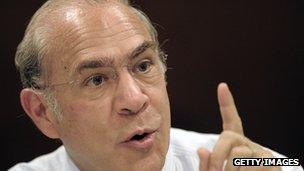#OWS: The brand leaders cannot afford to ignore
- Published
- comments
Cannes, France: I can sense very clearly here at Cannes that this is the moment "the masses" start shaping the policy response to the global financial crisis.

OECD chief Angel Gurria says the protesters 'have a point'
Why? Because everybody I speak to, interview or discuss background with keeps dropping the words "Occupy Wall Street" into the conversation. In fact if #OWS were a global brand, like the designer apparel shops that line the Rue d'Antibes here, it would have a profile to die for among the super-elite.
#OWS has, in just a few weeks, become global shorthand among policymakers for "what can happen" if they don't regain control of the situation. Once you get a coalition of perfectly ordinary people saying "we've had enough", and then you have to watch as the cops baton and taser them in the name of the trespass laws, you know you are in a reputational crisis.
Angel Gurria, boss of the OECD, external, who I've just interviewed, is not the first to say "they have a point". There needs to be a social aspect to the anti-crisis response: something to stimulate growth and give hope to a generation that have had their future cancelled: that is pretty much accepted among every one of the G20 nations that is a democracy.
But to turn the corner, so that structural reform does not just come as a message about lower wages, fewer employment rights etc, you have to get over the fiscal crisis stage. And the problem is we are not over it.
The Greek fiasco - and it really is a fiasco: I've met senior policymakers who have no idea why George Papandreou did this, or why the timing, or where it ends - is a reminder of how quickly things can spiral out of control.
If we conclude that it was democratic pressure on Pasok that prompted the surprise move to a referendum, then the word "Greece" suddenly has a whole new significance in the G20.

The Occupy Wall Street movement is symbolised by a ballet dancer on a bull
Up to now people have looked at Mr Papandreou and said: "That's what happens if you let your sovereign debt get out of control. Tut, tut." Now they see Mr Papandreou and think: "That's what happens when you let your streets get out of control."
Athens spiralled out of control two weeks ago: the sight of Communists in crash helmets fighting anarchists and right-wing nationalists in balaclavas did not please those who have read the micro history of the Greek Civil War.
My hunch is that someone in the Pasok hierarchy - maybe someone in the deep support networks the party has in the Greek town and village - simply said: "George - we can no longer sell this to our people."
In any case, anybody with even remote knowledge of the early 1930s knows that the moment street politics within a nation start dictating its stance at international summits is the moment you have to worry about the global system fragmenting.
Tonight on Newsnight - as well as reporting on the latest here - I will be exploring some of the parallels with the 1930s. Though the policymakers will be playing a straight bat here, saying a multi-lateral, co-ordinated approach is the only way, two top UK economists I've interviewed - one from the free market wing and one Keynesian - are remarkably close to saying it's time to forget worrying about protectionism, and for the mainstream to start responding to the demands for national solutions.
The rationale: if the mainstream does not deliver - as in the 1930s, others will try.
The subtext: it's probably better to deal with protesters whose symbolic image is a ballet dancer pirouetting on top of the Wall Street bull statue, than some other, less politically endearing iconography.